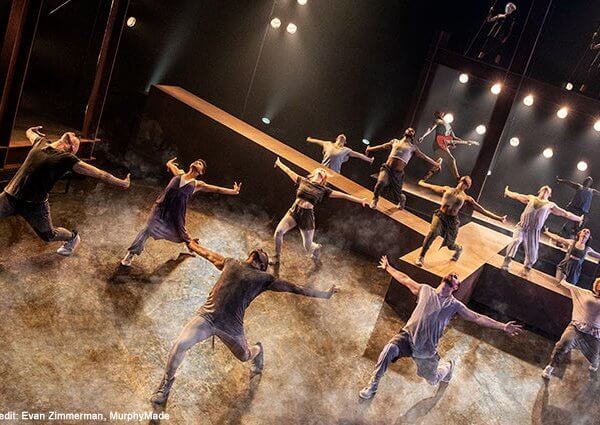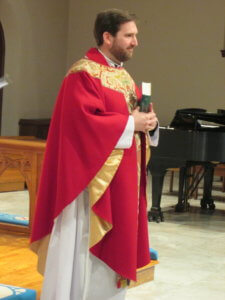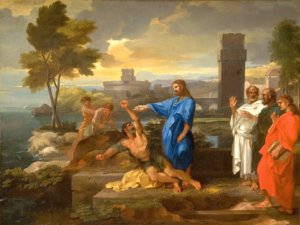
You Don’t Need A Ticket to See Jesus Christ, Superstar
This week, we pick up in Luke’s gospel where we left off last week: at the synagogue in Jesus’ hometown of Nazareth. Jesus has been getting a great reception in villages all over the Galilee, where people are meeting Jesus for the first time. He’s building up a following. People are excited. He’s preaching and teaching and changing people’s lives all around region.
 Jere and I had the great fortune to be given special tickets to see Jesus Christ, Superstar Thursday night in Providence. It was a phenomenal production, and the dancing and stagecraft were wildly imaginative and beautifully executed to help us see in our context — in a way we can understand in our times — how it might have seemed and felt in any of the little fishing villages around the Sea of Galilee in Jesus’ time. All of the Galilean characters — Jesus’ followers — were dressed in loose exercise clothes and hoodies, giving them an urban, youthful feel, in contrast to the more authoritative-looking black clothing and capes of the Roman power structure — the chief priests and scribes and King Herod. The costuming really emphasized Jesus’ and his followers’ humble lifestyle, and also was loose and flexible for their amazing dancing, which was the show’s means of expressing the crowd’s growing excitement and passion as Jesus became a superstar.
Jere and I had the great fortune to be given special tickets to see Jesus Christ, Superstar Thursday night in Providence. It was a phenomenal production, and the dancing and stagecraft were wildly imaginative and beautifully executed to help us see in our context — in a way we can understand in our times — how it might have seemed and felt in any of the little fishing villages around the Sea of Galilee in Jesus’ time. All of the Galilean characters — Jesus’ followers — were dressed in loose exercise clothes and hoodies, giving them an urban, youthful feel, in contrast to the more authoritative-looking black clothing and capes of the Roman power structure — the chief priests and scribes and King Herod. The costuming really emphasized Jesus’ and his followers’ humble lifestyle, and also was loose and flexible for their amazing dancing, which was the show’s means of expressing the crowd’s growing excitement and passion as Jesus became a superstar.
Bring Good News
 As I mentioned, we pick up today in Jesus’ hometown of Nazareth, where we read in last week’s gospel that he had unrolled the scroll and read from Isaiah’s prophecy that he — Jesus — had been sent by God to bring good news to the poor, release to the captives, and recovery of sight to the blind. So far so good. Can’t you imagine yourselves in church — so pleased to see a new priest who came up in this church — think of Charles Cowan, beloved Emmanuel seminarian — come back in a big homecoming to preach? Can’t you see them, turning to each other — checking to see if their neighbors are getting all of this. They’re so proud. Luke’s gospel tells us, All spoke well of him and were amazed at the gracious words that came from his mouth. They said, “Is not this Joseph’s son?”
As I mentioned, we pick up today in Jesus’ hometown of Nazareth, where we read in last week’s gospel that he had unrolled the scroll and read from Isaiah’s prophecy that he — Jesus — had been sent by God to bring good news to the poor, release to the captives, and recovery of sight to the blind. So far so good. Can’t you imagine yourselves in church — so pleased to see a new priest who came up in this church — think of Charles Cowan, beloved Emmanuel seminarian — come back in a big homecoming to preach? Can’t you see them, turning to each other — checking to see if their neighbors are getting all of this. They’re so proud. Luke’s gospel tells us, All spoke well of him and were amazed at the gracious words that came from his mouth. They said, “Is not this Joseph’s son?”
But then things take a sharp turn. Jesus continues his sermon, I’m sure you’ll quote to me from the proverb, ‘Doctor, cure yourself!’ And you will say, ‘Do some of those miracles we’ve heard you did back in Capernaum here in Nazareth — your home town.” Would they have said those things? Maybe. But they hadn’t yet, at least in Luke’s story of this event. And then Jesus takes it even further. Truly I tell you, Jesus says. And you know that Truly I tell you is bible talk for “listen up, guys. I really mean this.” Truly I tell you, Jesus says, no prophet is accepted in the prophet’s hometown.
God’s Love is Not Reserved for Insiders
Well, strictly speaking there’s no evidence of that yet, either. But when Jesus tells them that God’s love is not reserved for insiders — his own hometown best buds — the crowd turns on him immediately. Everyone in the synagogue was filled with rage, Luke’s gospel tells us. Now that’s a turn on a dime for the crowd, even though Jesus had predicted it in his comment that no prophet is accepted in the prophet’s hometown. It seems like Jesus is getting a little ahead of himself when Jesus first mentions it in this story, but it comes true really quickly in the narrative.
Why are Jesus’ family friends — his own hometown besties — so mad at him? Luke’s gospel tells us that everyone in the synagogue — mad as all get-out — got up, drove him out of the town, and led him to the brow of the hill on which their town was built, so that they might hurl him off the cliff. I’d say that’s pretty angry. Jesus knew that what he was going to say would be provocative, and maybe upsetting. But why, because they were all completely with him until that point?
 He told them that they didn’t have an inside track because they’d known him since he was a boy. That God’s love was not reserved for insiders, but is drawn — specifically, and compassionately — toward outsiders and those on the margins. He mentions the many widows in Israel in the time of Elijah, when the heaven was shut up three years and six months, and there was a severe famine over all the land; yet Elijah was sent to none of them except to a widow at Zarephath in Sidon. He continues, there were also many lepers in Israel in the time of the prophet Elisha, and none of them was cleansed except Naaman the Syrian.
He told them that they didn’t have an inside track because they’d known him since he was a boy. That God’s love was not reserved for insiders, but is drawn — specifically, and compassionately — toward outsiders and those on the margins. He mentions the many widows in Israel in the time of Elijah, when the heaven was shut up three years and six months, and there was a severe famine over all the land; yet Elijah was sent to none of them except to a widow at Zarephath in Sidon. He continues, there were also many lepers in Israel in the time of the prophet Elisha, and none of them was cleansed except Naaman the Syrian.
What is Jesus saying here? He’s not telling us that we are not special, or that we’re not loved by God. He’s not even speaking directly to us. Remember, we’re listening in here. We’re eavesdropping on a conversation held among the Jews in Nazareth. And Jesus is telling them — and all of us now — that it is not the special status of our original kinship by birth or hometown that is key. We are not excluded from God’s love if we’re not from the right nation, race, gender, or socio-economic status.
It’s a message that’s hard to hear if we’re counting on our privilege or other status to be our ticket into the life of being a disciple of Jesus Christ, Superstar. But the message sounds different when we recognize where we stand in this story. Come now, oh Prince of Peace, make us one body. Come now, Lord Jesus, reconcile your people. Amen
